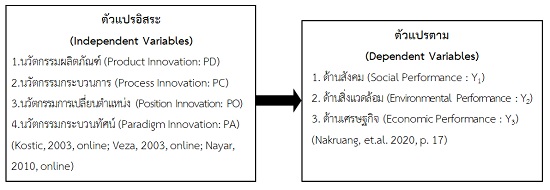INNOVATIVE FACTORS OF THE CONSTRUCTION INDUSTRY BUSINESS AFFECTING SUSTAINABLE PERFORMANCE
DOI:
https://doi.org/10.14456/nrru-rdi.2022.79Keywords:
Innovation, Sustainable performance, Construction industry businessAbstract
The research on innovative factors in the construction industry business affecting sustainable performance has the following objectives: 1) to analyze the level of business innovation factors, 2) to analyze the level of sustainable performance factors, and 3) to analyze the level of influence of innovation factors on sustainable performance in the construction industry. The samples were taken using probability sampling with a purposive method from engineers working in the construction industry in Bangkok and its vicinity, Chonburi and Nakhon Ratchasima, the economic center of Thailand, including 100 samples. A questionnaire with a reliability of 0.982 was used as a tool to collect data from the sample by an online method. Factor-level data were analyzed by descriptive statistics consisting of percentage, mean, and standard deviation, and factor influence-level data using inferential statistical analysis of multiple regression models. The results showed that the innovation factor of the construction industry's businesses was average at a medium level. Sustainable performance factors are pretty high. Process innovation, repositioning, and paradigm factors directly influenced sustainable performance in the construction industry with a statistically significant level of 0.05, demonstrating that the organization's belief in building a business network in the construction industry will increase sales and profits for the organization.
References
Bamgbade, J. A., Nawi, M. N. M., Kamaruddeen, A. M., Adeleke, A. Q., & Salimon, M. G. (2022). Building sustainability in the construction industry through firm capabilities, technology and business innovativeness: empirical evidence from Malaysia. International journal of construction management, 22(3), 473-488.
Boonyungyuen, W., & Laofor, C. (2020). A study of sustainable construction waste management. In The 25th National Convention on Civil Engineering, 15-17 July 2020 (pp. CEM-26-1-CEM-26-7). Online conference. (In Thai)
Brundtland, G. H. (1987). Report of the World Commission on environment and development:" our common future.". UN
Cochran, W. G. (1977). Sampling techniques. John Wiley & Sons.
de Oliveira, A. C., Sokulski, C. C., da Silva Batista, A. A., & de Francisco, A. C. (2018). Competencies for sustainability: A proposed method for the analysis of their interrelationships. Sustainable Production and Consumption, 14, 82-94.
Hair, J. F., Anderson, R. E., Babin, B. J., & Black, W. C. (2010). Multivariate data analysis: A global perspective (7th ed.). New Jersey : Pearson education Inc.
International Institute for Sustainable Development. (1987). What is Sustainable Development?. Retrieved September 29, 2021, from http://www.iisd.org/sd/
Kaewjunant, S., & Pongpeng, J. (2020). Factors for Evaluating Building Sustainability of Contractors Affecting Competitive Advantage. Ladkrabang Engineering Journal, 37(4), 27-35. (In Thai)
Khanin, S., Derhaliuk, M., Stavroyany, S., Kudlasevych, O., & Didkivska, L. (2022). Paradigm of the Transformation of Potential-Forming Space Under the Impact of Intellectual-Innovation Determinants. International Journal of Computer Science & Network Security, 22(1), 340-346.
Khiawkaew, N. (2020). The Study on the Development of Presentation for Construction by Augmented Reality (AR) Technology. Journal for Research and Innovation Institute of Vocational Education Bangkok, 3(1), 57-66. (In Thai)
Kline, R. B. (2011). Principles and practice of structural equation modeling (3rd ed.). New York : The Guilford Press.
Kostic, M. (2003). Innovation management – 4 P’s of Innovation. Retrieved September 29, 2021, from http://www.veza.biz/eng/4Pinnovation.html
Linprasert, S., Tapimai, S., Teeraset, S., & Pongpeng, J. (2021). Common factors affecting social sustainability of contractor organizations: a view from management and operation division. In The 26th National Convention on Civil Engineering, 23-25 June 2021 (pp. CEM-30-1 - CEM-30-8). Online Conference. (In Thai)
Nakruang, D., Donkwa, K., & Suvittawat, A. (2020). The Causal Factors Influencing Corporate Sustainability Performance: Case of Community SMEs in Three Southern Border Provinces, Thailand. Entrepreneurship and Sustainability Issues, 7(3), 1459-1471. DOI:10.9770/ jesi.2020.7.3(2)
Nayar, V. (2010). Employees first, customers second: Turning conventional management upside down. U. S. Canada : Harvard Business Press.
Nopparat, T. (2020). Construction business opportunities in the new normal. Prachachat Business. Retrieved September 29, 2021, from https://www.prachachat.net/columns/news-653542 (In Thai)
Office of the National Economic and Social Development Council. (2014). Philosophy ofSufficiency Economy (4th ed.). Bangkok. Retrieved September 29, 2021, from http://social.nesdc.go.th/social/sep/ (In Thai)
Rovinelli, R. J., & Hambleton, R. K. (1976). On the use of content specialists in the assessment of criterion-referenced test item validity. Dutch Journal of Educational Research, 2, 49-60.
Singer, A. J., & Thode, H. C. Jr. (1988). Statistical power analysis for the behavioral sciences. Hillsdale (NJ) : Lawrence Erlbaum Associates.
Tavakol, M., & Dennick, R. (2011). Making sense of Cronbach’s alpha. International Journal of Medical Education, 2, 53-55.
Veza. (2003). Innovation management-4 P’s of Innovation. Retrieved September 29, 2021, from http://www.veza.biz/eng/4Pinnovation.html
Zhanbayev, R., & Irfan, M. (2022). Industrial-Innovative Paradigm of Social Sustainability: Modeling the Assessment of Demoethical, Demographic, Democratic, and Demoeconomic Factors. Sustainability, 14(12), 7280.

Downloads
Published
How to Cite
Issue
Section
License

This work is licensed under a Creative Commons Attribution-NonCommercial-NoDerivatives 4.0 International License.




